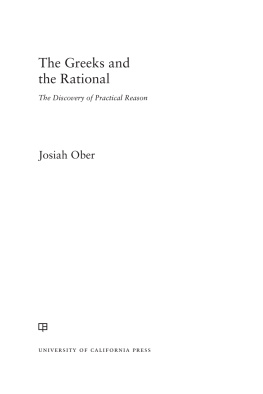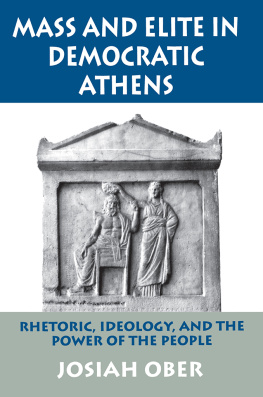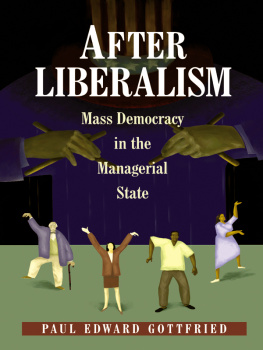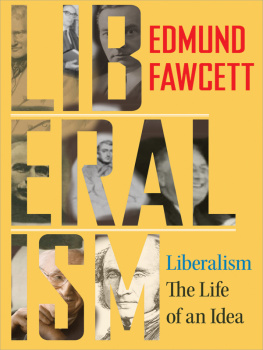Demopolis
What did democracy mean before liberalism? What are the consequences for our lives today? Combining history with political theory, this book restores the core meaning of democracy as collective and limited self-government by citizens. That, rather than majority tyranny or human rights, is what democracy meant in ancient Athens. Participatory self-government is the basis of political practice in Demopolis, a hypothetical modern state powerfully imagined by award-winning historian and political scientist Josiah Ober. Demopolis's residents aim to establish a secure, prosperous, and nontyrannical community, where citizens govern as a collective, both directly and through representatives, and willingly assume the costs of self-government because doing so benefits them, both as a group and individually. Basic democracy, as exemplified in real Athens and imagined Demopolis, can provide a stable foundation for a liberal state. It also offers a possible way forward for religious or otherwise nonliberal societies seeking a realistic alternative to autocracy.
Josiah Ober is currently Professor of Classics, Political Science, and (by courtesy) Philosophy at Stanford, and he has chaired both a department of humanities (Classics at Princeton) and a department of social science (Political Science at Stanford). He has held visiting professorships in the UK, France, and Australia. His previous books have won prizes from the American Philological Association, the Society for Institutional and Organizational Economics, and the Association of Academic Publishers and have been translated into French, German, Greek, Italian, Chinese, Korean, and Turkish.
The Seeley Lectures
The John Robert Seeley Lectures have been established by the University of Cambridge as a biennial lecture series in social and political studies, sponsored jointly by the Faculty of History and the University Press. The Seeley Lectures provide a unique forum for distinguished scholars of international reputation to address, in an accessible manner, topics of broad interest in social and political studies. Subsequent to their public delivery in Cambridge, the University Press publishes suitably modified versions of each set of lectures. Professor James Tully delivered the inaugural series of Seeley Lectures in 1994 on the theme of Constitutionalism in an Age of Diversity .
The Seeley Lectures include
(1) Strange Multiplicity: Constitutionalism in an Age of Diversity JAMES TULLY ISBN 978 0 521 47694 2 (paperback) Published 1995
(2) The Dignity of Legislation JEREMY WALDRON ISBN 978 0 521 65092 2 (hardback) 978 0 521 65883 6 (paperback) Published 1999
(3) Women and Human Development: The Capabilities Approach MARTHA C. NUSSBAUM ISBN 978 0 521 66086 0 (hardback) 978 0 521 00385 8 (paperback) Published 2000
(4) Value, Respect, and Attachment JOSEPH RAZ ISBN 978 0 521 80180 5 (hardback) 978 0 521 00022 2 (paperback) Published 2001
(5) The Rights of Others: Aliens, Residents, and Citizens SEYLA BENHABIB ISBN 978 0 521 83134 5 (hardback) 978 0 521 53860 2 (paperback) Published 2004
(6) Laws of Fear: Beyond the Precautionary Principle CASS R. SUNSTEIN ISBN 978 0 521 84823 7 (hardback) 978 0 521 61512 9 (paperback) Published 2005
(7) Counter-Democracy: Politics in an Age of Distrust PIERRE ROSANVALLON ISBN 978 0 521 86622 2 (hardback) 978 0 521 71383 2 (paperback) Published 2008
(8) On the People's Terms: A Republican Theory and Model of Democracy PHILIP PETTIT ISBN 978 1 107 00511 2 (hardback) 978 0 521 18212 6 (paperback) Published 2012
(9) The Politics of the Human ANNE PHILLIPS ISBN 978 1 107 093973 (hardback) 978 1 107 475830 (paperback) Published 2015
(10) The Sleeping Sovereign: The Invention of Modern Democracy RICHARD TUCK ISBN 978 1 107 130142 (hardback) 978 1 107 570580 (paperback) Published 2015
Demopolis
Democracy before Liberalism in Theory and Practice
Josiah Ober
Stanford University, California
University Printing House, Cambridge CB 2 8 BS , United Kingdom
One Liberty Plaza, 20th Floor, New York, NY 10006, USA
477 Williamstown Road, Port Melbourne, VIC 3207, Australia
4843/24, 2nd Floor, Ansari Road, Daryaganj, Delhi 110002, India
79 Anson Road, #0604/06, Singapore 079906
Cambridge University Press is part of the University of Cambridge.
It furthers the University's mission by disseminating knowledge in the pursuit of education, learning, and research at the highest international levels of excellence.
www.cambridge.org
Information on this title: www.cambridge.org/9781316510360
DOI: 10.1017/9781108226790
Josiah Ober 2017
This publication is in copyright. Subject to statutory exception and to the provisions of relevant collective licensing agreements, no reproduction of any part may take place without the written permission of Cambridge University Press.
First published 2017
Printed in the United Kingdom by Clays, St Ives plc
A catalog record for this publication is available from the British Library
ISBN 978-1-316-51036-0 Hardback
ISBN 978-1-316-64983-1 Paperback
Cambridge University Press has no responsibility for the persistence or accuracy of URLs for external or third-party internet websites referred to in this publication and does not guarantee that any content on such websites is, or will remain, accurate or appropriate.
For Denise, Spike, Stella, Blanche, Bindi, and Enki.
They pounced.
Contents
Figures
Tables
Preface: Democracy before Liberalism
Imagine a country that is secure, prosperous, and ruled by its citizens. They disagree on many things, some of them very deep and important. But they agree about the high value of collective self-government, and they are willing to pay the costs of having it. The people of this country live with freedom of speech and association, political equality, and civic dignity. But they have not settled on their stance in regard to state religion. Nor have they committed to promoting universal human rights at home or abroad. Nor have they decided on a principle of social justice for distributing the benefits of social cooperation. Call that country Demopolis and its government basic democracy.
This book asks what it would mean to be a citizen of Demopolis. What will be gained and what is lost when life in Demopolis is compared to life in a liberal democracy? I answer those questions, first, from the vantage point of a worried liberal, one who hopes to shore up the political foundations of liberal values and who believes that government could be something other than a potentially intrusive threat to personal liberty combined with a potentially paternalistic provider of distributive outcomes. But I also try to answer questions about what life in Demopolis would entail from the very different perspective of a religious traditionalist residing in an autocratic state. The traditionalist I have in mind dreams of a life without autocrats but is not ready to embrace contemporary liberal values. Does a theory of democracy have anything to say to him or her?
I focus on democracy before liberalism because I suppose (without arguing the point) that in the twenty-first century, liberalism is the dominant value system with which democracy has been interwoven. Political liberalism is the tradition in which I was raised and to which I remain deeply attached; I have no wish to live in a society that is anything other than a liberal democracy. But, like every value system, liberalism obscures what it does not promote. I argue that the intermixture of liberalism has obscured the positive value of collective self-government, as an instrument to desired ends and as a choiceworthy end in itself. I hope to show liberals why it is a wrong to regard citizen participation in government as a cost that can or should be minimized. And that it is a mistake to view a preference for citizen self-government and a fear of government captured by self-interested elites as uniquely appropriate to populists, anarchists, or Schmittian agonists.











